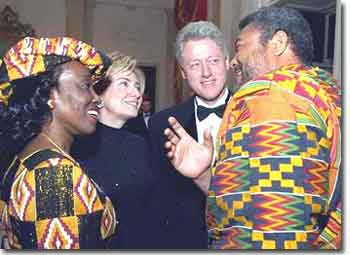Biography -- William J. Clinton
Bill Clinton was born William Jefferson Blythe III on August 19, 1946, in Hope, Arkansas, three months after his father died in an automobile accident. In high school, he took the name of his step father, Roger Clinton of Hot Springs, Arkansas. 
Bill Clinton graduated from Georgetown University and was awarded a Rhodes Scholarship to Oxford. He received a law degree from Yale in 1973. After graduation, he returned to Arkansas and taught law at the University of Arkansas before entering politics. His 1974 campaign for Congress ended in defeat, but two years later he was elected Arkansas Attorney General.
In 1975, Bill Clinton married Hillary Rodham, whom he had met while a law student at Yale. In 1980 Chelsea, their only child, was born.
Bill Clinton was elected governor of Arkansas in 1978, but lost a bid for reelection in 1980. He regained the governorship two years later and served until 1993. During his 12 years in office, Governor Clinton earned national recognition for his progressive programs, especially his efforts to improve the quality of public education.
After a tough primary campaign, Bill Clinton won his party’s nomination and went on to defeat Republican President George Bush, and independent candidate Ross Perot in the 1992 presidential race. When President Clinton won reelection in 1996, he became the first Democrat since Franklin D. Roosevelt to win a second term.
Following the early failure of his health care reform initiative, President Clinton pursued a moderate but progressive domestic agenda. During his tenure, the welfare system was reformed, the sale of handguns was restricted, environmental regulations were strengthened, and a massive federal budget deficit was turned into a surplus.
On the international scene, the Clinton Administration expanded international trade, intervened militarily to end “ethnic cleansing” in Bosnia, launched peace and trade initiatives in Africa and the Middle East, and promoted a framework for peace aimed at ending the strife in Northern Ireland.
In 1998, his relationship with a young White House intern resulted in the President’s impeachment by the House of Representatives. A trial in the Senate found the President not guilty of the charges brought against him. President Clinton apologized for his conduct and vowed to keep working as hard as he could for the American people. As a result, Bill Clinton left office with historically high approval ratings for the job he had done as the 42nd President of the United States.
In the years since leaving office, President Clinton has dedicated his time to leading the development of global initiatives through his Foundation. The staff and volunteers of the William J. Clinton Foundation focus on programs of community service, drug acquisition for HIV/AIDS treatment, and fighting childhood obesity in the United States. The Clinton Global Initiative garners the expertise of leaders from around the world in addressing global issues of health care, education, clean energy and environment, job training, and entrepreneurship in under-developed countries.
Outside of his Foundation, President Clinton has worked alongside former Presidents George H. W. Bush, and George W. Bush, in disaster relief efforts for the tsunami in South Asia, Hurricane Katrina in the United States, and the earthquake in Haiti.
The entire list of Clinton's favorite books, listed alphabetically by author:
I Know Why the Caged Bird Sings, Maya Angelou.
The Denial of Death, Ernest Becker.
Parting the Waters: America in the King Years 1954-63, Taylor Branch.
Living History, Hillary Rodham Clinton.
Lincoln, David Herbert Donald.
Four Quartets, T.S. Eliot.
Invisible Man, Ralph Ellison.
The Way of the World: From the Dawn of Civilizations to the Eve of the Twenty-First Century, David Fromkin.
One Hundred Years of Solitude, Gabriel García Márquez.
The Cure at Troy: A Version of Sophocles' Philoctetes, Seamus Heaney.
King Leopold's Ghost: A Story of Greed,Terror,and Heroism in Colonial Africa,Adam Hochschild.
The Imitation of Christ, Thomas à Kempis.
Meditations, Marcus Aurelius.
Moral Man and Immoral Society: A Study in Ethics and Politics, Reinhold Niebuhr.
Homage to Catalonia, George Orwell.
The Evolution of Civilizations: An Introduction to Historical Analysis, Carroll Quigley.
The Confessions of Nat Turner, William Styron.
Politics as a Vocation, Max Weber.
You Can't Go Home Again, Thomas Wolfe.
Nonzero: The Logic of Human Destiny, Robert Wright.
The Collected Poems of W.B. Yeats, William Butler Yeats.













